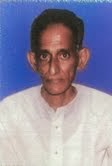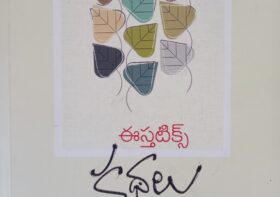G V Krishnarao’s Chaitraradham and Udabinduvulu

Article by: GRK Murty
Dr. G V Krishnarao (1914-1979) published two anthologies of short stories in Telugu: Chaitraradham with seven stories and Udabinduvulu with five stories. All the stories in Chaitraradham were written during 1939-42, while the stories in Udabinduvulu were written in 1947 except the story, “Udabinduvulu”, which was written in the year 1963.
His stories mostly depict the life of ‘ordinary people’ eking out their lives as lower middle-class farmers, peasants, farmhands or people living in the margins or the village folk that have migrated to the urban locales in search of greener pastures. All his stories are exquisitely realistic—there are no exaggerations, life is depicted just as it happens everyday, all the time.
The storyteller hailing from a rural background and being a crafty wordsmith, provides his characters with unpretentious quality of dialogs that never pop up bizarrely and this enables the characters just to get on with life as naturally as one sees it in real life. There is no melodrama, no grand statements, just a quiet focus on the life as a given and of course that makes the whole edifice look so natural that it tweaks our nerve chord—at times makes the heart squeak. A quick glance through his stories leaves an impression that ‘rationalism’ runs through all his stories as an undercurrent rather than irritating the reader as a rude intrusion.
Take, for instance, the story, “Chesukunna Karma”, that was written in 1947. It is basically a story of conversation between four individuals. The dialogs were intermittently interspersed with their soliloquies—soliloquies that sound more as man’s interaction with god. The principal character was Venkayya, a middle-class farmer; Lakshuvamma was his wife. They had two sons: Chantodu (Younger son) and Peddabbai(Elder son). And the fourth character was that of son-like Raghavai, their paleru—farmhand hired on an annual basis. Everyone loved Raghavai—right from asami (the farmer who hired Raghavai as a farmhand on an annual basis) to the he-calf in their cattle-yard looked at him with affection. Raghavai too had an equal sense of attachment towards the family. Their relationship was cemented by mutual love and trust.
The story begins with the arrival of Pullai, father of Raghavai, at Venkayya’s house for re-negotiating the annual wages for his son. As Pullai sought a rise in the annual wage for his son, Raghavai, from the present 50 to 75, the debt-ridden Venkayya expressed his inability and instead advised him to place his son with those who are ready to give higher wage—without any acrimony. But to the surprise of the whole village, Raghavai refused to leave Venkayya’s family.
As time rolled on, Venkayya became scary of his mounting debts. Indeed, the very thought of debts shook him violently. On one such occasion late in the night, he rued on his karma thus: “I have not transgressed my varna dharma—the eternal laws of my caste. Why this ill-fate to me? And why such ‘fortunes’ to the village shavukar? What ‘good’ he has done? Hasn’t he ruined many families? I have not cheated anybody. Yet why fortunes to shavukar (the village money-lender) and this ill-fortune to me? Might be… he did pious deeds in the previous janma, birth! Does it mean, karma rides over even god! Why, then… god? Oh! Am I to ridicule god?”— and suddenly shuddered by that very thought, praying god to forgive his foolishness, Venkayya questions himself: “What should I do now?” And finally, he did sell the land and cattle and cleared the debts.
Shell-shocked by the news of Venkayya selling even cattle, Lakshuvamma stood motionless for a while. After a while, recouping herself, walked into the cattle shed and sitting a little away from Raghavai, told him, “Seems, your dora (respectful way of addressing Raghavai’s employer) sold away the bullocks.” Blowing her nose, she narrated to Raghavai the plight of the family and soliloquized, “After all, what can he do, when our karma is like this? Our plight has quite worsened. How can anyone stop it?.”
That night, Raghavai too spent a sleepless night brooding about his own karma: “Why have I been staying with Venkayya all along? What is the outcome of my sweating out for all these years? Even asami didn’t gain anything. Nor did I!” That made his empty stomach twirl and he murmured. “Why… then… this labor? What if, had it been under someone else? What extra would it have resulted in? Why this laboring unmindful of one’s own wellbeing? Just for belly’s sake? Is it merely for the belly? Is that what I lived for? What if, I don’t live this life at all? Which god will cry? What is that I am craving for? After all, isn’t it for bullocks and farming? No doubt about that. Isn’t it the selling off of the young bull that I fed and trained, which had terribly disturbed me? It means, all that I need is the bullocks and a handful of farm that is productive. I can be content working with them. My life could then pass off happily. Despite selling my labor and my independence, how is it that I am not getting what I am interested in?” Finally, Raghavai too, throws the blame for his current plight on his karma!
However, the shackles that have been holding him with Venkayya’s family for all these days had simply broken without he being aware of it. Completing morning chores, he put on washed clothes, packed the soiled clothes and hanging them to one end of the staff, walked straight to the house and called Lakshuvamma. They all came out. “I am Going amma!” said Raghavai. “Where?” asked Lakshuvamma in a surprised tone. “Haven’t thought of it, yet.” “Will you go to your father?” asked Venkayya. “No! I won’t.” That made everyone speechless. As he started, Chantodu cried at once. He-calf bellowed. Led by the calf, all the cattle in the yard mooed in chorus. Yet that day, all that bellowing and the crying of Chantodu could not lay shackles on Raghavai’s legs. And thus ends the story.
The storyteller, being a philosopher, expounded the multi-layered nature of karma through Venkayya, Lakshuvamma and Raghavai, who undergoing an intensive and penetrating examination of their own beliefs and motives, identified their true svabhava, nature, and undertook an action that answered their inner needs. In the process, their action was depicted more as a lakshana, trait, rather than a sadhana, a discipline undertaken in the pursuit of a goal. And through them the writer, perhaps, wants to say that life is a constant self-creation, unless one lives in inertia, and the ultimate bliss for man lies in his using the mind, life and body as his apparatus to surpass the karma.
As the reader comes out of the uneasy calmness that reading of “Chesukunna Karma” engulfed him with, there is yet another equally interesting story ready to take the reader round the life of a farmhand in a rural ecosystem that was besieged with many conflicts. Here too, the name of the farmhand was Raghavulu and he was just like that of the Raghavai of the previous story, but the treatment meted out to him by asami was just inhuman. For, after all, no two individuals are alike and the world is neither wholly good nor bad! Here too, the young farmhand was totally devoted to his asami’s welfare.
Raghavulu had big dreams: wanted to become an able and skilled worker in every aspect of farming and its allied activities; aspired to excel even Ramigadu who was known in the village for his competence in controlling even unruly bullocks—indeed, he dreamt to become a better farmhand in the whole village. Driven by such aspirations, he was, obviously, so devoted to his asami’s welfare that he even once offered to break four coconuts before his deity, all with his money, if the asami’s cow gave birth to he-calf. He was also known not to let anybody take away even the cow dung from his asami’s cattle shed or field, yet he was often meted out ill-treatment by his asami. He had to tend such rogue cattle which, once untethered by this young boy, like the then Congress leaders shuttling between jails and power centers, would rush to the haystack and if hawked from there would rush into the cattle shed making it a hell for him to get them all out of the yard on to the road to fields; and ironically to tend such a unruly lot, his asami won’t give him even a proper shaft.




Jasthi Jawaharlal
excellent review of GVK’s stories. Thanks for it.